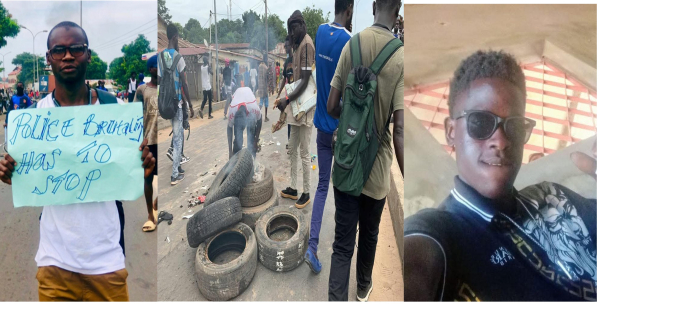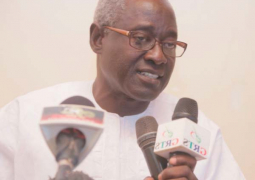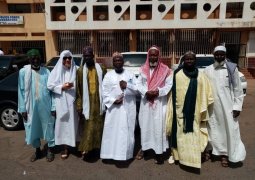
Eyewitnesses to the incident claimed that the deceased, Omar Badjie, was allegedly beaten by police officers while in handcuffs. They further alleged that Mr Badjie was found in possession of a small quantity of cannabis, which led to his arrest.
From the early hours of Friday, Mandinari’s streets filled with mourners turned demonstrators, young and old, men and women, marching in solidarity on Saturday. Their destination: Lamin village, several kilometres away. Their message: clear and resolute. Placards bearing slogans such as “No to Police Brutality”, “Justice for Omar”, and “We Demand Accountability” lined the route.
Despite a heavy presence of riot police from the Police Intervention Unit (PIU), the demonstrators pressed on, determined to reach the Anti-Crime Unit headquarters in Banjulinding to demand the unconditional release of fellow villagers arrested the previous night.
At the NTC Junction in Lamin, PIU officers attempted to halt the march, urging protesters to disperse. The crowd, however, surged forward, breaking through the police barricade and taking over the Lamin-Brikama highway. The situation quickly deteriorated as PIU officers regrouped near Lamin Market and deployed tear gas to disperse the crowd.
In response, protesters set tyres ablaze and hurled stones, bringing traffic to a standstill. Vehicles were forced to divert through inner Lamin routes as chaos unfolded on the main highway.
Red Cross volunteers were on the scene, tending to those affected by tear gas exposure. Several individuals were transported to nearby health centres for treatment.
Senior police officials, including the Assistant Inspector General of Police Operations, joined community leaders from Mandinari in efforts to de-escalate the situation. After tense negotiations, two police pickup trucks arrived carrying the detained youths, who were released and reunited with their families.
Presidential Youth Adviser Lamin K. Saidy and village elders accompanied the released detainees back to Mandinari, a moment that briefly restored calm.
However, the return to Mandinari was marred by renewed clashes. Stone-throwing resumed, prompting another round of tear gas from PIU officers. Eventually, the youth retreated to their homes, and the riot police withdrew, leaving behind a community still grappling with grief, anger, and unanswered questions.
Background: How the Lamin incident began?
The unrest began when a large group of youths gathered at the NTC main junction en route to Mandinari. On the left side of the road, heading towards Mandinari, there is a multi-storey building. A group of men, believed to be Mauritanian nationals, were seen taking photographs of the youths from the top floor of the building.
The youths reportedly asked the men to stop filming them. When the request was ignored, they began throwing stones at the building. In response, police officers stationed on the main highway moved in to disperse the crowd, which led to the youths redirecting their aggression towards the police. Moments later, the police was able to control the situation.
As officers of the Police Intervention Unit (PIU) returned to their base at the Anti-Crime Unit (ACU) headquarters in Banjulinding, a group of youths, many believed to be from Lamin, regrouped and reignited unrest.
They burned tyres, blocked the road, and hurled stones, warning onlookers to stop filming or risk having their phones confiscated. The group began marching towards the Banjulinding end of the highway.
During the unrest, a Nigerian national who owns a shop on the right side of the road just past the Jah Oil Petrol Station was reportedly attacked by the angry youths. He was severely beaten and had to be rushed to a nearby health centre by Red Cross volunteers. Items from his shop were allegedly looted in the chaos.
Upon receiving reports of renewed violence, PIU officers made a swift u-turn and returned to the scene in an attempt to restore order. Tear gas was again deployed to disperse the crowd. As the youths fled into Lamin, riot police pursued them into the town, leading to a gradual return to calm and normalcy.
As the dust settles, Mandinari’s call remains unwavering: justice for Omar Badjie, and accountability from those sworn to protect.
Read Other Articles In Headlines
Over D900,000 theft case lands in court
Sep 13, 2023, 11:33 AM




